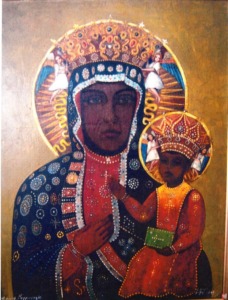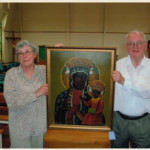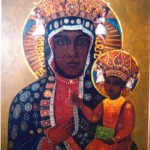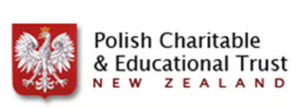Polish Refugees in New Zealand 1944-1951
Exhibitions
Gifts, Letters and News

This image of Our Lady of Częstochowa, as the Queen of Poland was painted by a Polish soldier, Sergeant Major Feliks Krzewinski, in Loreto, Italy, during the Italian Campaign of World War II. It was gifted to the children of the Polish Children’s Camp, Pahiatua, by the soldiers of the Third Carpathian Division of the Polish Second Army Corps.
Stefania Zawada (Sondej): This picture has been entrusted to St Brigid’s Church, Pahiatua by the former children, on the 70th Anniversary of the commencement of their exile from Poland, which started on 10th February 1940, with the deportations of their families to the Soviet Union forced labour camps. After being detained for over two years in USSR and then spending another two years as refugees in Iran, they arrived in New Zealand, on the 31 October 1944.
Cupramarittimao Italy, 05.08.1 945
Gentlemen,
You will see work of very high artistic level and other, very modest – created by hand accustomed to bearing arms. But all work has one common attribute – this work was created under the dictates of a soldier’s heart…..
These words were spoken by the Commander of the 3rd Carpathian Infantry Division, General Bronislaw Duch, when addressing the Official guests present at the opening of an exhibition of works of art created by his soldiers in the difficult conditions of the Italian campaign. They were gifts to be sent to a New Zealand wartime organization “The Polish Army League”. Also displayed was the picture of Our Lady of Częstochowa, painted at Loreto, Italy, by Sergeant Major Feliks Krzewiński and dated as of 15 August 1944, which he gave to the Polish Army Department of Protection of Soldier’s Families, with an intention to have it sent to the Polish Children of the Polish Children’s Camp at Pahiatua, New Zealand, as a gift from the soldiers of the 3rd Carpathian Infantry Division. The official guests present were the New Zealand Brigadier William George Gentry, who represented the Commander of New Zealand 2nd Division, General Bernard Cyril Freyberg, with a group of New Zealand officers, the Mayor of the town of Cupramarittima and representatives of the local population, also representatives of the Polish Army units.
Later, in a letter addressed to the “Polish Army League”, in New Zealand, General Duch further expanded on his spoken words. He wrote:
This second consignment of gifts, we have sent to New Zealand, is a sincere expression of our goodwill and gratitude. May everyone in your Country speak of our friendship, which was born during the fighting in Libya and consolidated during the Italian Campaign, where alongside the Carpathian Division, the brave New Zealand soldier marched into battle for ideals, which are the ideals of people who love freedom.
The gifts we are sending you have been created by a rough hand of a soldier, a hand used to handle arms in battle and not used for work in the field of arts. Therefore we ask you, please do not look at these gifts the way you would look at works of art, because they were forged by the soldiers’ simple grateful hearts, polished by their goodwill coloured by friendship and gratitude for the New Zealand Nation’s deep consciousness of the fate of our children.
The children referred to are the 733 Polish Children who arrived in New Zealand on 31 October 1944 at the invitation of the New Zealand Government and were to be given shelter in New Zealand till the end of the Second World War, when they were to return to Poland. However at the conclusion of the hostilities Poland was allowed to fall under USSR’s domination and became a Communist state. Most of the children remained in New Zealand and eventually became New Zealand citizens.
The “Polish Army League” to whom General Duch addressed his words was founded in Palmerston North on 14 December 1941. The purpose of the organization was to befriend lonely Polish soldiers fighting in the Allied Armies, initially in the Middle East. It was strictly a non-political and a non-sectarian organization. Anyone could join the League by obtaining the name of a Polish soldier from the Secretary and adopting that soldier for the duration of the war. Adopting meant writing regularly and sending something, like a book or food parcel, from time to time. The contacts obtained from the Polish Army were mainly from the 3rd Carpathian Infantry Division of the General Anders’ Second Polish Army Corps.
The Polish soldiers were grateful for this kindness, especially as many of them had lost contact with their families. Also, they were deeply moved when they found out about the help offered to Polish Children by the Government and people of New Zealand. Following the example of the “Polish Army League”, the soldiers of the 3rd Carpathian Infantry Division adopted the children of the Polish Children’s Camp at Pahiatua. Over a period of time they sent the children approximately 500 books for their library and use in the classrooms, also individual soldiers were given children’s names to write to. Each child at the Camp was to receive a letter from a Polish soldier. Despite the tragic events which were taking place in Poland after the War, the young soldiers did not lose their morale. The letters they wrote to the children were full of encouragement.
Here are some quotes:
To a Polish child in New Zealand!
Fate brought you to New Zealand. We know well that you long for your fatherland, but nothing can be done, we must still wait. We must not forget that we are its free citizens and therefore we have to make use of the present free time. We must study! I know that you attend school and are studying well, but please become aware that we soldiers are also studying. Yes, we are studying – we have put our guns aside and grabbed a book.
Another soldier wrote:
I also attend school, which commenced at the time of the ltalian campaign. I for example, when my battalion was moved back from the front line attended College, but when we had to fight again for Bologna, I had to go to the front. Later, I again returned to College. Now, that the War has in the meantime terminated, nothing is distracting me from my studies.
Another soldier encourages the child not to give up:
I was born in Poland in 1923, in the “Wołyn” District. I was deported to USSR and later in January 1942 joined the army and arrived in the Middle East. Now I am in ltaly. I fought at Monte Cassino, Ancona, on the shores of the Adriatic Sea and Bologna. I was wounded once, but it does not matter, I still have arms and legs. Now I am doing my third year at College. We live in the mountain region. It is beautiful here – the winter is approaching and the snow has already covered the higher peaks. We are very satisfied with the conditions, but we long for Poland. However, we will not return to the present Poland, we will return to a truly free Poland – bearing arms.
Another soldier tried to offer support:
To a Polish child
In our soldier’s newspaper often there are articles about you. They write that some of you have no father, nor mother and that these children are sad. Maybe you do not have parents – please write to me about it.
Another soldier tried to reassure the child that she belongs:
My Polish girl,
I do not know your name, but I do know that you love your Country and her Army, so please support it in the best way you can, the way your mother taught you -with a sincere prayer to the Lady who defends Częstochowa.
Another soldier offers advice:
We must firmly believe that the Queen of Poland will have mercy on us and will allow us to return where our hearts and souls dwell now.
Many of the soldiers, who wrote to the children, would remember these children from the time back, when in 1941, after the Polish prisoners and deportees were allowed to leave prisons and labour camps, and they travelled thousands of kilometres to the Southern Republics of USSR to join the newly forming Polish Army. The civilian population followed seeking refuge there – mothers with children, and thousands of orphans, who were sometimes brought by an adult, or came by themselves because their dying mothers told them to go and find the Polish Army, where they will find help. Some orphans, who were placed in Russian institutions and found out that there is a Polish Army, wrote letters begging to be rescued. The Polish Army sent out special envoys to find them.
Orphanages sprung up around the Polish Army, which at that time consisted of thousands of starved men, not yet uniformed nor armed properly.
The Red Army, even though now fighting on the side of the Western Allies, obstructed the formation of the Polish Army in many ways, trying to integrate it into its fighting force. The Polish recruits were given only half the required rations and they went hungry. The Polish soldiers stood firm and shared their meagre rations with their civilian population and orphans received their special care. When the Polish Army was, being evacuated from USSR to Iran, General Anders of the Second Polish Army Corps gave an order that as many as possible children be included in the transport, even those who were gravely ill, even if they needed to be carried into the railway carriages.
After the War, the Polish soldiers who started writing to the children at the Pahiatua Polish Children’s Camp and their comrades at arms, all must have realized that the children who were in New Zealand are not likely to return to their homeland, so they placed them in the care of our Lady of Częstochowa and sent the children, Her picture, painted by one of them.
Extracts from a pamphlet produced by Stefania Zawada 2009
Voices
Photos






